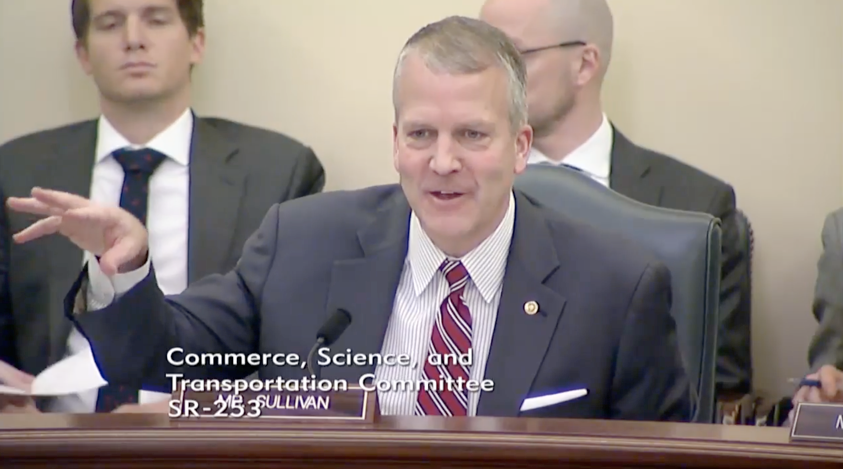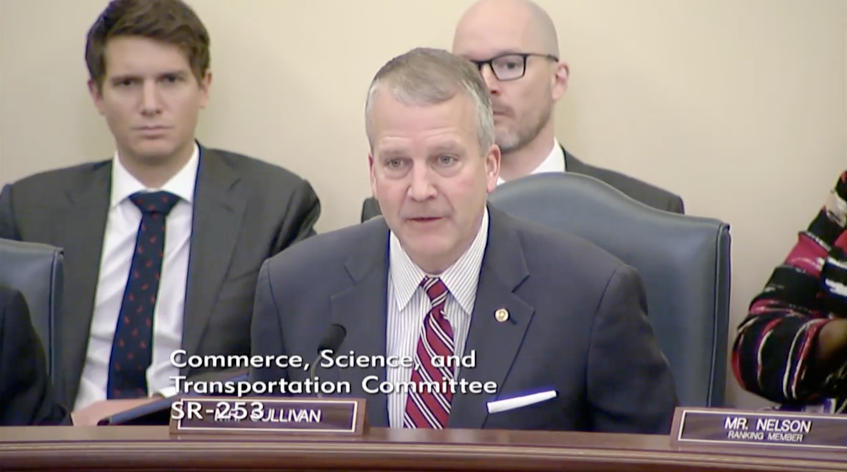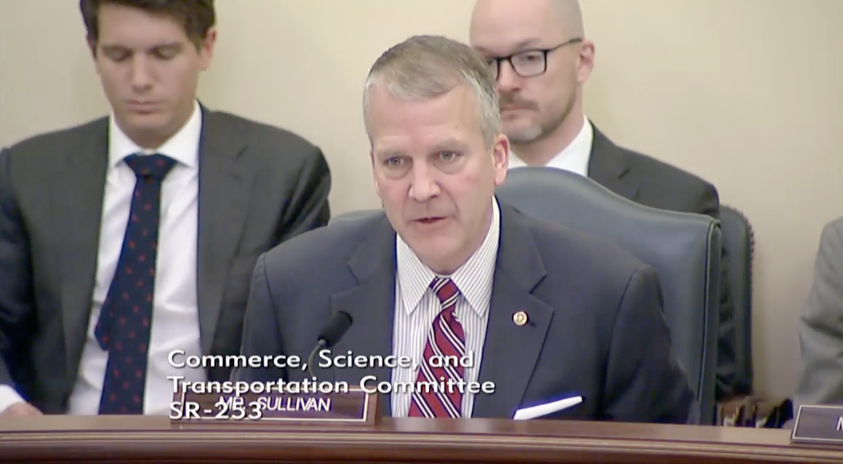Sullivan Chairs Hearing on Nominee to Head NOAA
Receives commitments on Alaska-based NOAA missions and personnel, seafood trade, and hydrographic surveys
Washington, D.C. – Senator Dan Sullivan (R-AK) last week chaired a hearing in the Senate Committee on Commerce, Science, and Transportation on the president’s nominee, Barry Lee Myers, to serve as administrator of the National Oceanic and Atmospheric Administration (NOAA). If confirmed, Myers would serve as Under Secretary of Commerce for Oceans and Atmosphere and oversee many critical operations for Alaska, including daily weather forecasts, severe storm warnings, fisheries science and management, and ocean mapping and science.
“In my home state of Alaska, we are particularly dependent on NOAA’s services,” Senator Sullivan stated to the Committee. “Alaska is the superpower of seafood, accounting for almost 60% of all domestic landings and more than 60,000 jobs – making the fisheries industry our largest private employer – more than oil and gas. NOAA is the agency responsible for oversight of America’s fisheries, and I will be among those working closely with the Under Secretary for Oceans and Atmosphere to ensure a continuing bright future for this very important segment of the U.S. economy. NOAA is also responsible for charting our waters, providing accessible, timely and accurate weather forecasting, and studying and help keep clean our unique and treasured oceans and natural resources. All missions of extreme importance for the country and my state as well.”
Senator Sullivan, who took the reins of last week’s nomination hearing at the request of Chairman John Thune (R-SD), immediately took the opportunity to highlight the misguided practice to locate Alaska-based personnel, infrastructure and missions outside of the 49th state. Of the many examples currently in place, Sullivan highlighted two: the NOAA research vessel Fairweather, which by law must be homeported in Ketchikan but actually resides in Oregon; and the Alaska Regional Coordinator of NOAA’s Marine Debris Program who is currently based in Seattle, WA.

Sullivan on NOAA assets and personnel: “No other Senator would tolerate such a situation” (click here to watch).
“NOAA has entire offices that are directly focused on Alaska because we’re so big and have so many important elements of the NOAA mission. Yet, so much of NOAA staffing and infrastructure for Alaska-based missions are not located in Alaska,” said Sullivan. “…No other Senator would tolerate such a situation where an executive agency focuses exclusively on their state’s weather and NOAA-related issues and aren’t even based in that state. To be the most effective and cost effective to the taxpayer, NOAA staff and assets who work solely on Alaska issues must be in Alaska. The previous administration did little to work with me on this. I would like your commitment to help restore the agency’s presence, as appropriate when working on Alaska issues, to be in Alaska.”
After receiving a full commitment to conduct a complete review and assessment on Alaska-based assets and personnel based outside of Alaska, Sullivan next received assurances from the NOAA nominee to work on addressing a growing seafood deficit facing both Alaska and the nation.

Senator Sullivan discussing the importance of reducing barriers that place American seafood at a trade disadvantage (click here to watch).
“You mentioned in your opening statement the issue of seafood trade. I’ve appreciated Secretary Ross’ emphasis on trying to doing something on the seafood trade deficit. The agencies under NOAA’s purview have a lot to do with it,” Sullivan stated. “Will you work with me and other seafood exporters to reduce barriers that put us at a completive disadvantage with regard to other countries?”
Sullivan closed by focusing on the longstanding issue of updating Alaska’s and the nation’s backlog of hydrographic charting and surveys.

Sullivan emphasizing the need for leadership to resolve the nation’s growing hydrographic survey backlog (click here to watch).
“One other area that impacts Alaska, but it impacts the whole country, is the issue of hydrographic surveying,” Sullivan said. There are parts of my state that still rely on charts and data collected back in the 1800’s when Russia was still in charge of Alaska. There’s a potential to address the backlog of hydrographic surveying in Alaska, but also throughout the entire country, through partnerships with the private sector. But, there’s needed leadership for this to happen. Will you work with the committee to aggressively reduce the charting backlog and increase the use of public private partnerships to achieve this goal in terms of upgrading hydrographic surveying across the country?”
Like many of the answer before, Sullivan received a brief, but definitive commitment to work to resolve this outstanding issue.
“Yes I will Senator,” said Mr. Myers.
###
Next Article Previous Article
